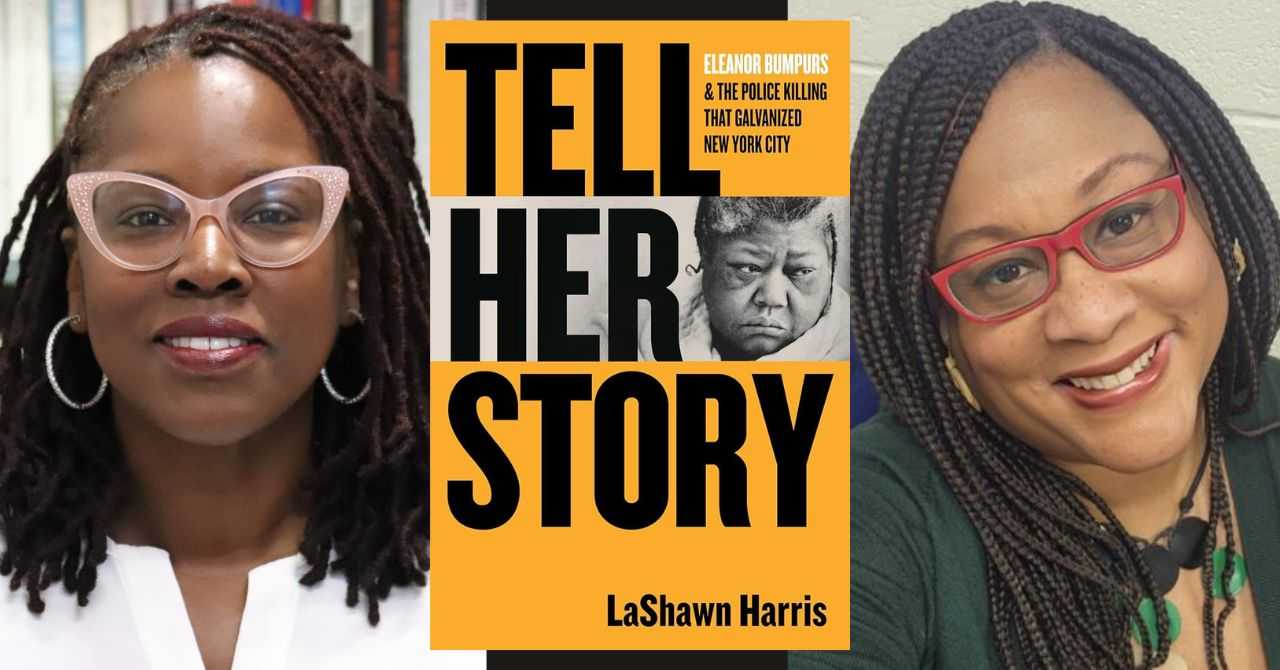- Cafe
- Bookstore
- Upcoming events
- Book an event
- Catering
- Institutional and bulk sales
- About Red Emma's
- Press
- Buy gift cards
- Red Emma's merch
- Jobs
- Red Emma's Education Fund
- Oleander
- Baltimore Book Festival 2025

LaShawn D. Harris presents Tell Her Story: Eleanor Bumpers and the Police Killing That Galvanized New York City" in conversation w/ Michelle R. Scott
This event has already happened.
On October 29, 1984, 66-year-old beloved Black disabled grandmother Eleanor Bumpurs was murdered in her own home. A public housing tenant 4 months behind on rent, Ms. Bumpurs was facing eviction when white NYPD officer Stephen Sullivan shot her twice with a 12-gauge shotgun. LaShawn Harris, 10 years old at the time, felt the aftershocks of the tragedy in her community well beyond the four walls of her home across the street.
Now an award-winning historian, Harris uses eyewitness accounts, legal documents, civil rights pamphlets, and more to look through the lens of her childhood neighbor’s life and death. She renders in a new light the history of anti-Black police violence and of the watershed anti-policing movement Eleanor Bumpurs’s murder birthed.
So many Black women’s lives have been stolen since—Deborah Danner, Sandra Bland, Breonna Taylor, Sonya Massey—and still more are on the line. This deeply researched, intimate portrait of Eleanor Bumpurs’s life and legacy highlights how one Black grandmother’s brutal police murder galvanized an entire city. It also shows how possible and critical it is to stand together against racist policing now.
LaShawn Harris is an Associate Professor of History at Michigan State University and former Managing and Book Review Editor for the Journal of African American History (JAAH). She is a historian of U. S. history with a focus on African American, Black Women’s, and urban histories. Harris’s scholarly essays have appeared in JOURNAL OF SOCIAL HISTORY, JOURNAL OF URBAN HISTORY, AND SOULS: A CRITICAL JOURNAL OF BLACK POLITICS, CULTURE, AND SOCIETY. Her first monograph SEX WORKERS, PSYCHICS, AND NUMBER RUNNERS: BLACK WOMEN IN NEW YORK CITY’S UNDERGROUND ECONOMY was published by the University of Illinois Press in 2016. In 2017, Sex Worker, Psychics, and Numbers Runners won the Organization of American Historians (OAH) Darlene Clark Hine award (best book in African American women’s and gender history) and the Philip Taft Labor Prize from The Labor and Working-Class History Association (LAWCHA). Harris’s work has been featured in popular media outlets including TV-One, Glamour Magazine, Huffington Post, Elle, Vice, The History Channel, and Black Perspectives. In 2019, Harris was appointed to the Organization of American Historian’s Distinguished Lectureship Program. Currently, Harris is completing a monograph for Beacon Press that examines police violence in New York City during the 1980s. Follow her on Twitter: @madameclair08.
Dr. Michelle R. Scott joined the History Department at the University of Maryland Baltimore County (UMBC) after earning her B.A. at Stanford University and her M.A. and Ph.D. degrees at Cornell University. Professor Scott is also professor at UMBC’s Africana Studies and Gender, Women’s + Sexuality Studies departments, as well as the Language, Literature, and Culture Doctoral Program. Her research interests include Black musical and entertainment culture, Black women’s studies, African American history, 20th-century United States history, and civil rights activism. Professor Scott's book, BLUES EMPRESS IN BLACK CHATTANOOGA: BESSIE SMITH AND THE EMERGING URBAN SOUTH was published by the University of Illinois Press in 2008 and influenced the screenplay of HBO’s Bessie. Scott has also published work in academic journals as well as TENNESSEE WOMEN: THEIR LIVES AND TIMES, THE COLUMBIA GUIDE TO AFRICAN AMERICAN HISTORY, 1939-PRESENT, and the 2nd edition of BLACK WOMEN IN AMERICA. Dr. Scott’s forthcoming book, T.O.B.A. TIME: BLACK VAUDEVILLE AND THE THEATER OWNERS BOOKING ASSOCIATION IN JAZZ AGE AMERICA, (University of Illinois Press, 2023) is a study of the origins and economic ramifications of a 1920s national black vaudeville theater circuit that trained Cab Calloway, Count Basie, Bessie Smith, and the Nicholas Brothers, among many others, during the Jazz Age.

